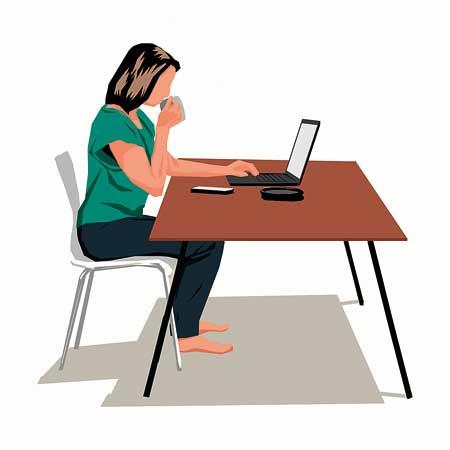Reply To:
Name - Reply Comment
Post-Pandemic Effects on the Workforce
With the pandemic, working from home was introduced to every nook and corner of the world as workers in almost every field shifted into an online workspace. However, now people are back in their workplaces but it seems that the post-pandemic changes also come with long-term effects, and many workers aren’t satisfied with how things
every field shifted into an online workspace. However, now people are back in their workplaces but it seems that the post-pandemic changes also come with long-term effects, and many workers aren’t satisfied with how things
have changed.
“Working from home has become the new normal even after we started going back to the office physically”
Many are of the view that the Work from Home concept has been abused in Sri Lankan workplaces and it has become a habit even after the pandemic to demand unhealthy amounts of employees’ attention and time. Those who previously came home from work at around six or seven in the evening now work late at night till nine or ten from home. Workers in Sri Lanka who were not used to these long shifts are suffering from several physical and psychological issues that resulted due to the long-term changes that came along with it.
“Even after physical school started, parents keep sending petty complaints to teachers through group chats”
 A teacher from an international school at Beruwala said that previously they had a day allocated after school for the parents to discuss their problems with them. With the pandemic however, they had to make several official chat groups to keep in touch with the students. Now even after physical school started, she explained that parents are used to the habit of keeping continuous contact with them and keep sending petty complaints and insignificant questions expecting the teachers to reply and solve those problems at any given time of the day.
A teacher from an international school at Beruwala said that previously they had a day allocated after school for the parents to discuss their problems with them. With the pandemic however, they had to make several official chat groups to keep in touch with the students. Now even after physical school started, she explained that parents are used to the habit of keeping continuous contact with them and keep sending petty complaints and insignificant questions expecting the teachers to reply and solve those problems at any given time of the day.
“It’s stressing me out!”
“It’s stressing me out and I feel like I’m at school 24/7.” she said. She said that she has seven official groups and seven personal groups just for school that were created with the pandemic and most of the parents now are demanding a lot more from the teachers even after school hours. “I’m myself a mother of two children, pursuing higher education and earning from extra tuition classes. Whenever I come online for any kind of personal work, a swarm of messages from parents and students flow into my phone. We don’t have time for all of that.” She explained that she even got into a problem with a father of a student because she wasn’t responding fast enough to his messages about his daughter.
“Having to be stationary longer when I’m working from home has led to many health complications such as gastritis”
An executive working in a private company in Colombo mentioned that their office continued working from home even after the pandemic. This stretched his working hours to more than nine hours per day. According to him, having to wear headsets for extremely long hours for meetings and having to attend meetings and do work out of standard working hours as availability to the system at home, is very draining and exhausting. “Having to be stationary longer when I’m working from home has also led to many health complications such as gastritis,” the executive said. He also mentioned that having very little involvement with people physically and the immense difficulty in managing people online is definitely causing stress and that it has increased his anger-management issues.
“Life became monotonous and boring and consequently I became very depressed”
A student counsellor in Colombo who is also studying at university told us that coming home after work doesn’t feel relaxing anymore. “Even after the pandemic, we are expected to work from home, after office hours and I can’t even find time to study with the workload. Now the only relaxing time I get is when I’m at university over the weekend. I dread going home even on the weekend knowing the amount of work I have waiting at home for me.” She mentioned that working from home has become the new normal even after they started going back to the office physically.
“Even after the pandemic, we are expected to work at home after office hours and I can’t even find time to study with the workload”
A software engineer and a working mother told the Daily Mirror that time management became the most challenging thing for her. “Since the pandemic, working from home was the only method of working I’m doing and life became monotonous and boring and consequently I became very depressed,” she said. She explained that she’s someone who likes to go out a lot and that socializing really powers up her brain. Since the pandemic, meetups with friends have become almost non-existent to her as she’s now working from home almost the entire day.
Online education and work from home methods proved to be beneficial and effective to many during the pandemic and even during the fuel crisis. But spending unhealthy amounts of time on one’s career while working from home, has definitely taken a toll on society with its long-term effects. Those who are still working at home or are working additional hours from home, experience greater emotional exhaustion and cognitive stress and it’s high time that their long-term effects are addressed at workplaces in Sri Lanka as well.